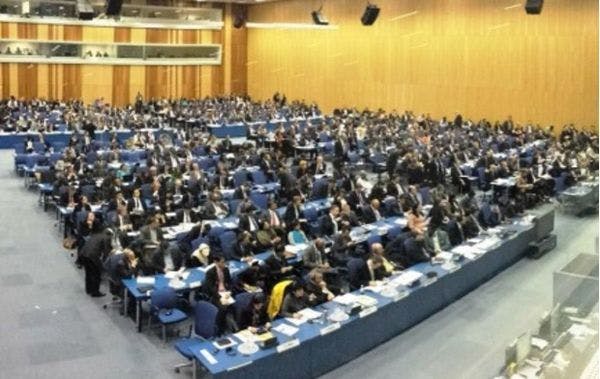IDPC
The 64th Session of CND: ‘An African war on Africa’
By Maria-Goretti Loglo (IDPC Consultant: Africa) and Charity Monareng (Parliamentary and Policy Research Officer · TB HIV Care)
Every year, governments worldwide gather at the UN Commission on Narcotic Drugs (CND) in Vienna for debates about the global drug situation. This year's session (12-16 April) was a unique one, as it turned out to be the first-ever virtual session of the CND. In a week-long session, governments took the floor to tell the world about their drug policies and responses. Whilst some countries are exploring innovations and finding alternatives to the old methods, many are still supportive of punitive drug control efforts that exacerbate harm.
While there has been progress in Africa to implement more humane and people-centred drug policies and practices, the CND remains a constant reminder of how far we still have to go. As Africans, it was disheartening to hear so many of our government representatives reiterating their support for a failed, colonial war on drugs in Africa. Over and over again, we heard about the number of arrests and seizures that were made. But there was no consideration of the impacts on the lives of the people most affected – the high levels of violence in the name of drug control, disproportionate punishments, police corruption, courts being hopelessly congested and prisons overcrowded. This is always brushed under the carpet by our governments.
Kenya, Tanzania, Mauritius, Cote D'Ivoire, Senegal, Sierra Leone and South Africa are among those currently implementing harm reduction services for people who use drugs, while countries like South Africa, Lesotho, Zimbabwe and Malawi have legally regulated medical cannabis production. Yet these stories are not being heard on the international platform. Even Ghana, which has taken bold steps towards decriminalisation, declined to even mention these reforms when they spoke – instead delivering a generic statement about maritime trafficking, the dark-web and different brand names being used.
Of particular concern is the low number of African governments that have permanent diplomatic representation in Vienna. This has allowed a small number of African countries with a Vienna presence (the “Africa Group”) to claim to speak on behalf of the entire continent, and misrepresent the African voice without consultation. This behaviour came to a head at the 2016 UN General Assembly when the ‘Africa Group’ position was in opposition to that of the more diplomatically developed African Union Common Position. Since then, the ‘Africa Group’ (primarily led by Nigeria and Egypt) has delivered regional statements at every CND which reaffirm targets to eliminate drugs and denounce more progressive moves (including decriminalisartion) as ‘misguided’. Therefore, it is quite surprising that African countries, at this point in their history, where evidence has shown that the war on drugs has not only been a tremendous failure but has proven to be a war against Africans. At the same time, some African countries have chosen to replicate best practices by attempting to strike a balance between supply reduction and demand reduction, calling for more resources to implement harm reduction and ensuring adequate availability of essential medicines like Tramadol and Morphine for pain management.
At this year’s CND, Nigeria and Egypt continue to push for the international control of Tramadol, the only opioid medication for pain management that is available across much of our region. The World Health Organisation (WHO) has been requested to review the evidence on Tramadol several times, and has repeatedly recommended that it is not placed under control – as doing so would impede its medical availability. Yet Nigeria in particular are on a mission to undermine this decision, driven by their concerns about non-medical use of street-level opioids that are referred to as Tramadol (but studies have shown that much of this is falsified and not actually Tramadol in the first place!).
Currently, Africa is experiencing a shortage of adequate pain management and palliative care medicine – as outlined in the African Common Position on Controlled Substances and Access to Pain Management Drugs. Tramadol fills a critical gap in treating pain across the continent. Unfortunately, attempts to apply stricter controls will increase "opiophobia" and discourage pharmacies from stocking the medicine. We have seen the impact this has had on the availability of morphine and other legitimate medicines in our health systems. The rural poor will continue to suffer in pain.
With only ten years until the 2030 target date of the Sustainable Development Goals, African leaders need to acknowledge drug use as a public health and development problem. They need to begin pursuing alternatives to punishment for minor offences, developing people-centred policies and reallocate resources to provide treatment, care and support. After all, the ultimate objective of the UN drug control system is explicitly to improve health and well-being. One step towards this will be to balance out the African voice and engagement at the CND. We need more African governments to actively engage, and to more honestly reflect the more progressive developments back home. We need African governments to challenge the statements and processes of the so-called ‘Africa Group’, to increase accountability, and put Africa’s interests first – rather than calling for controls and decisions which would directly harm Africans. Civil society also has a role to play in promoting this – and for bringing these voices to Vienna even if governments won’t.
Topics
Related Profiles
- International Drug Policy Consortium (IDPC)
- Maria-Goretti Ane
- TB/HIV Care Association (THCA)
